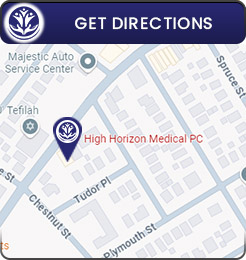Diabetes Management: Tips for Lowering Blood Sugar
Managing diabetes effectively involves maintaining a healthy lifestyle and following your healthcare provider’s recommendations. To lower blood sugar levels, focus on a balanced diet rich in fruits, vegetables, and whole grains. Regular physical activity, such as brisk walking or swimming, can also significantly improve blood sugar control. Monitor your blood sugar regularly to track your progress and make necessary adjustments to your diet, exercise, or medication. If you have any concerns or questions, consult Dr. Ali Tabarroki, MD at High Horizon Medical PC. For more information, contact us or schedule an appointment online. We are conveniently located at 396 Hempstead Avenue, West Hempstead, NY 11552.


Table of Contents:
How can I manage my diabetes?
How do you lower a diabetics blood sugar?
What are diabetes ABCs and how do you manage them?
What are the recommended targets for blood glucose levels?
How does our doctor help with diabetes management?
Living with diabetes is a lifelong commitment, one that requires careful management of lifestyle choices, diet, and medication. Dr. Tabarroki emphasizes the importance of monitoring your blood sugar levels regularly. With devices such as a blood glucose meter or a glucometer, his guidance can help you understand how your diet, activity levels, and medication impact your blood sugar levels.
He advocates for a balanced diet. His advice includes reducing intake of processed foods and sugary drinks, focusing on fruits, vegetables, whole grains, and lean proteins, and consulting with a registered dietitian for personalized dietary guidance.
Regular physical activity is another critical aspect of managing diabetes. He suggests engaging in moderate physical activity for at least 30 minutes most days of the week or a structured exercise program. Frequent exercise promotes insulin sensitivity, helps people maintain a healthy weight, and lowers blood sugar levels.
It’s essential to manage lifestyle factors. He advises quitting smoking and reducing alcohol consumption, both of which can interfere with blood sugar regulation. Adequate sleep is also important for hormonal balance and insulin sensitivity.
He recognizes the impact of stress on blood sugar levels and recommends incorporating stress management techniques such as yoga, meditation, or spending time in nature should become a daily habit.
Remember, managing diabetes is an ongoing journey of maintaining good habits over time. With the direction and assistance of our team, you can effectively control blood sugar levels, reduce the risk of complications, and live a healthy and fulfilling life.
We are committed to helping patients manage their diabetes and lower their blood sugar levels. In order to assist you in maintaining stable blood sugar levels, our team will provide you with guidance on how to eat a balanced diet that is high in fiber, lean proteins, fruits, vegetables, and whole grains and low in refined carbohydrates and sugars.
We recommend suitable exercises and physical activities that are effective in lowering blood sugar levels. Our team can also provide guidance on keeping up a healthy weight, which is essential for blood sugar regulation.
We will prescribe and manage medications necessary to manage your diabetes. Regular blood glucose monitoring is also essential in managing diabetes.
Stress can significantly affect blood sugar levels. We recommend effective stress management techniques to help lower blood sugar levels.
Regular check-ups with us will ensure your blood sugar levels are monitored, medications are adjusted as necessary, and any changes in your condition are discussed.
We are aware of how critical comprehensive diabetes care is. We help our patients understand the Diabetes ABCs – three critical aspects that every individual with diabetes must manage effectively: A1C, blood pressure, and cholesterol.
A1C (A)
We monitor your A1C levels, which show your average blood glucose (or blood sugar) level over the past two to three months. With regular blood tests, exercise, and a balanced diet, we work together to manage your A1C levels effectively.
Blood Pressure (B)
We aim to maintain your blood pressure below 140/90 mmHg. Regular monitoring, dietary changes, physical activity, and medications are all part of our approach to blood pressure management.
Cholesterol (C)
We aim to keep your LDL (bad cholesterol) below 100 mg/dL and your HDL (good cholesterol) above 60 mg/dL. Regular cholesterol tests, dietary changes, exercise, weight management, and medication are all part of our approach to cholesterol management.
Understanding the recommended blood glucose targets is crucial for managing these conditions and maintaining optimal health. For non-diabetic adults, fasting blood sugar levels should ideally be less than 100 mg/dL. For those diagnosed with diabetes, the American Diabetes Association recommends a fasting blood sugar target of 80-130 mg/dL and a postprandial blood sugar level of less than 180 mg/dL. For patients with prediabetes, the recommended fasting blood sugar range is 100-125 mg/dL.
For pregnant women diagnosed with gestational diabetes, fasting blood sugar levels should be less than 95 mg/dL, while pre-meal levels should range between 85-115 mg/dL. Post-meal levels should be less than 120 mg/dL after one hour and less than 140 mg/dL after two hours.
In addition to blood glucose levels, we also monitor A1C levels, which provide an average blood sugar measurement over the past two to three months. Less than 5.7% on an A1C test is regarded as normal; 6.5% or more on two different tests indicates diabetes.
Consistently checking blood sugar levels and sustaining a healthy lifestyle are key strategies in managing diabetes and prediabetes effectively and improving overall health outcomes.
Dr. Ali Tabarroki plays a pivotal role in diabetes management. His comprehensive approach begins with an exhaustive assessment and diagnosis process that includes physical exams, blood tests, and an evaluation of your medical history. This thorough evaluation aids in determining the type of diabetes, its severity, and the most effective treatment plan.
In cases where blood glucose levels cannot be managed through diet and exercise alone, we prescribe medication or insulin therapy.
We also provide detailed dietary guidance to help manage blood sugar levels, offering advice on healthy eating habits, portion control, and nutritional choices that support glucose regulation. Alongside dietary advice, we recommend regular physical activity, advising on the appropriate intensity, duration, and kind of exercise that lowers blood sugar and increases insulin sensitivity.
Lifestyle modifications are another critical component of diabetes management. We encourage patients to make changes such as quitting smoking, reducing stress, and getting adequate sleep. These modifications contribute to overall wellbeing and can positively impact diabetes management.
Regular monitoring and follow-up appointments are crucial for assessing blood sugar control and making necessary adjustments to the treatment plan. These check-ups, including periodic laboratory tests such as A1C tests, are essential for catching complications early, assessing long-term glycemic control, and preventing further health issues.
In essence, Dr. Tabarroki is your partner in managing diabetes, providing the necessary medical treatment, guidance, and education to help you live a healthy life with diabetes. For more information, contact us or schedule an appointment online. We are conveniently located at 396 Hempstead Avenue, West Hempstead, NY 11552. We serve patients from West Hempstead, NY, Mineola NY, Uniondale NY, New Hyde Park NY, Elmont NY, Lynbrook NY, Valley Stream NY, Rockville Centre NY, Queens NY, and surrounding areas.


Additional Services You May Need
▸ Primary Care
▸ Weight Loss
▸ Urgent Care
▸ HRT
▸ X-Ray
▸ Physical Exams
▸ Immunization Clinic
▸ Electrocardiogram (EKG)
▸ Rapid Lab Tests and Screening





